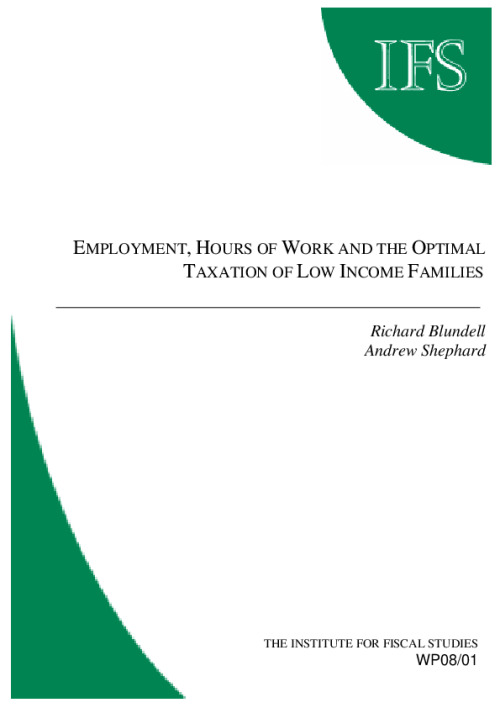Downloads

wp0801.pdf
PDF | 1.39 MB
<p><p>This paper examines the tax schedule for low income families with children. We take an optimal tax approach based on a structural labour supply model which incorporates unobserved heterogeneity, fixed costs of work, childcare costs and the detailed non-convexities of the tax and transfer system. The motivation is the British earned income tax credit reform (WFTC) and its interaction with the tax and transfer system for lone parents. Our analysis also examines the case for the use of hours-contingent payments. The results point to a tax schedule which depends on the age of children, with tax credits only optimal for low earners with school age children. The results also suggest a welfare improving role for hours-contingent payments although this is mitigated when hours cannot be monitored or recorded accurately by the tax authorities.</p></p>
Authors

CPP Co-Director
Richard is Co-Director of the Centre for the Microeconomic Analysis of Public Policy (CPP) and Senior Research Fellow at IFS.

Research Associate University of Pennsylvania
Andrew is a Research Associate at the IFS and an Associate Professor of Economics at the University of Pennsylvania.
Working Paper details
- DOI
- 10.1920/wp.ifs.2008.0801
- Publisher
- IFS
Suggested citation
Blundell, R and Shephard, A. (2008). Employment, hours of work and the optimal taxation of low income families. London: IFS. Available at: https://ifs.org.uk/publications/employment-hours-work-and-optimal-taxation-low-income-families (accessed: 5 May 2024).
More from IFS
Understand this issue

The £600 billion problem awaiting the next government
25 April 2024

Public investment: what you need to know
25 April 2024

If you can’t see it, you can’t be it: role models influence female junior doctors’ choice of medical specialty
24 April 2024
Policy analysis

Recent trends in and the outlook for health-related benefits
19 April 2024

4.2 million working-age people now claiming health-related benefits, could rise by 30% by the end of the decade
19 April 2024

Oil and gas make Scotland’s underlying public finances particularly volatile and uncertain
27 March 2024
Academic research

Labour market inequality and the changing life cycle profile of male and female wages
15 April 2024

Interpreting cohort profiles of lifecycle earnings volatility
15 April 2024

There and back again: women’s marginal commuting costs
2 April 2024